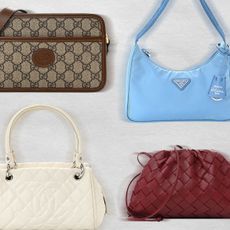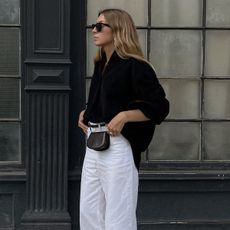Is There Any Truth to "Opposites Attract"?

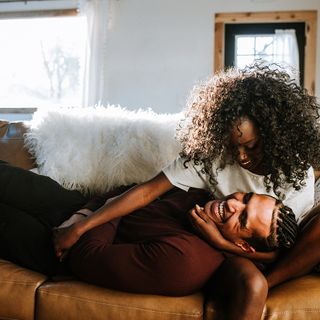
After every breakup I've gone through, the most common comment my friends make—aside from the loyal bestie statement that they never liked him to begin with—is that I had nothing of real substance in common with these boys: "You can't have a relationship based solely on the fact that you both like staying at nice hotels." "So the only thing you actually liked about him was that he can make you laugh?" "The two of you together just didn't make any sense."
I'm a pop culture–obsessed, sports-loving book nerd who happens to adore New York City nightlife. But I tend to fall for homebodies who couldn't care less about the newest speakeasy opening in the Lower East Side and haven't picked up a novel since it was required in high school. I'm also not very religious and am admittedly frivolous with my money, while the boys I've dated come from different but strong religious backgrounds and are quite frugal. Maybe it's my competitive nature to overcome any obstacle thrown at me, but the hopeless romantic in me cannot stop believing my soul mate will be someone who is nothing like me.
We all know—and most likely loathe—this popular theory on love that has been hammered into our hearts since our first rom-com. The princess falling for the commoner. The dumb jock falling for the quiet nerd. The player falling for the committed good girl. This is the theory of opposites attract.
Merriam-Webster defines the idiom "opposites attract" as a phrase "used to say that people who are very different from each other are often attracted to each other." It is a trope we've seen in TV shows and movies over and over again that not only applies to romantic relationships but friendships as well. It makes for a great story arch—two people from completely different backgrounds overcoming the odds to coexist and to a more romantic extreme, live happily ever after. But in reality, that couldn't be further from the truth.
If there are various studies that show relationships with a partner similar to you last longer, why are we so attracted to a theory that tells us to go after someone we have nothing in common with? Do we find thrill in the drama? Do we want to prove those odds wrong? We asked an astrologist, two psychologists, and the vice president of engineering at OkCupid to weigh in on this romantic phenomenon. Scroll down to see what they had to say.
The Astrologist
"Hey, baby, what's your sign?" may be one of the cheesiest pickup lines out there, but for those who believe in astrology, it's an important question in terms of compatibility.
Ophira Edut, one half of the AstroTwins, says that with the 12 astronomical signs, there are seven possible matches: same-sign, one-sign apart, two-signs apart, three-signs apart, four-signs apart, five-signs apart, and six-signs apart. Of those seven combinations, there are two that are considered the "most difficult" to get along with are those that are one sign apart and five signs apart.
In her book, which she co-wrote with her sister Tali, How to Get Along With Anyone, she breaks down why certain matches get along better than others and offers tips on how to how to get along with each sign. She writes that we unconsciously attract those we have little in common with "because our souls yearn to grow. We need to wake up, pay attention, and learn something."
For those one sign apart, it's all about the friction. She writes that it's a love-hate vibe due to the fact that neither one has any astrological traits in common. But the attraction is strong.
"All that friction can lead to explosive sexual chemistry and even an obsessive desire to figure each other out (heads up: You never completely will)," she writes. "Some astrologers believe that each sign is an evolved version of the one before it. According to that theory, the sign after yours plays the role of a teacher—although your pride may never allow you to admit it until years later."
For the couple that is five signs apart, this is the OG odd couple and has nothing in common astrologically. "From one moment to the next, you'll either feel like you're with a kindred spirit or a complete stranger, no matter how many years you've known each other," she writes. "Your bond is intense, unspoken, and baffling even to you. It's as though you've always known each other, but you can't really figure out how. We believe this is the ultimate past-life reunion when two people come together to sort out unfinished business."
If every single person you meet has meaning in your life, then those who are five signs apart from you are meant to teach you one of the biggest lessons, especially if it's a romantic relationship. "[They] may be in and out of your life for years, as you're together for a karmic lesson or specific purpose, then go your separate ways for a while," she writes. "There may be teary-eyed reconciliations once you've both grown wiser from experience. Or you could meet after you've both been through some heart-wrenching experience that forces you to grow and learn personal responsibility. In this case, you may simply appreciate your differences, rather than seeing them as a threat to your ego or worldview."
But as with all things related to astrology, these explanations aren't meant to deter anyone from dating someone who is either one sign or five signs apart from them. The book gives tips and advice on how to navigate these relationships and balance such different personalities. "You can make it work with anyone," she says.
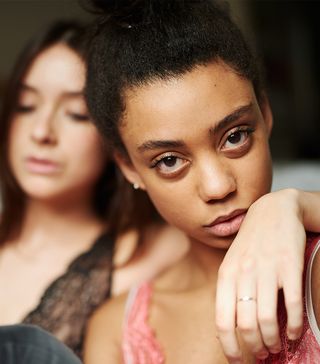
The Psychologists
We all love a good challenge. We root for the underdog story. The mismatched couple encompasses all those sentiments, and we can't help but be in awe of them. "[It's] because it's fascinating," says neuropsychologist Sanam Hafeez, PsyD. "Couples who are uniquely different are the most glamorous and garner more attention."
Hafeez says the element of mystery of how two different people can make a relationship work and the novelty of an oddball match have an alluring appeal. According to her, the way it is romanticized in movies, TV shows, and novels makes us believe that we too can beat the odds.
On the other side of the argument is the belief that the entire theory is a misconception. "Physically, we are attracted to those who look like us. Culturally, we are attracted to those who are from similar backgrounds. Psychologically, we are attracted to people with similar beliefs, values, and personalities," says Sara Konrath, PhD, social psychologist consultant for OkCupid. "This is one of the most established findings in the psychology of relationships of all kinds, whether friendship or romantic. But a recent large study using real online behaviors found that similarity is more important in romantic relationships than friendship."
Konrath does say there is one exception to this rule. "There may be a tendency for opposites to attract with more dominant [and] submissive personalities," she says. "It makes sense that people who prefer to take the lead would fit well with people who prefer to go with the flow. It also makes sense that people who don't have a preference either way would match well with others who are also somewhere in the middle."
She and Hafeez both agree that while it's not impossible for two people who are completely different to make it, it is fundamentally hard to change personality traits if you don't like them. "[For example], if you don't like someone's spending habits, it's a red flag not to ignore. No matter how attractive they are now, that will pale in comparison to the debt you find yourself in a few years later," says Hafeez. "That is not to say people can't overcome their differences. It just means it takes commitment and grit."

The Online Dating Expert
You would think online dating and dating apps would dispel this "opposites attract" theory completely. If you're filling out preferences and getting matched by those preferences, it should automatically weed out those who answered those questions differently. But that is not the case, especially at OkCupid.
"I think there's a difference between attraction and compatibility, and we don't actually pair people by similar interests or beliefs. We do it by displaying people who are accepting of each other's points of view," says Tom Jacques, vice president of engineering of OkCupid. "Now, the most common thing people are willing to accept is the beliefs they already hold, but that doesn't mean there isn't room for differences, and even when you do disagree on something, you're more likely to look past your differences if you can see what you do agree on."
In a live debate, Swipe Left: Dating Apps Have Killed Romance, Jacques explains that the OkCupid algorithm doesn't necessarily filter people out because they disagreed with someone on one thing. "What we do is we present to you the people who are available and we try to show you things that you can use to connect," he says.
He also agrees with Hafeez that meeting someone who is very different from you is appealing. "Someone who is the opposite of you is different and unknown. It's mysterious, and that kind of makes it interesting," he says. "Talking about dating your clone, on the other hand, sounds clinical and a little weird. You actually see both tropes in popular culture."
He also believes that it makes for a better love story. "It's more exciting and fun to think that two people who are so different can be so perfect," he says. "We tend to like the unexpected."
The most successful relationships he's seen are the ones who aren't necessarily very similar; it's about what your threshold is and what you're willing to look past. "What we actually see is that no two people are truly identical, and the success or failure of your relationship has more to do with how accepting you are of each other," he says. "It's generally easier to accept people with the same viewpoint, especially if they are core beliefs, but we try to focus on showing you what you have in common with each other and what you're willing to accept."
So will I continue to go for people who are the complete opposite of me? Honestly, I feel like I would—you can't help who you like, and like all our experts said, there's a strong allure to the unknown. But I'll approach things more cautiously and think about what I'm willing to compromise on. At least now I'm mature enough (at least I hope that I am) to understand that when it comes to a relationship with my opposite, I have to be willing to put in the work if I want it to last.
This story was originally published at an earlier date and has been updated.
Next up: 7 surprising health benefits of sex you never knew about.

Disclaimer
This article is provided for informational purposes only and is not intended to be used in the place of advice of your physician or other medical professionals. You should always consult with your doctor or healthcare provider first with any health-related questions.

Kate Moss. She's the OG beauty chameleon.
Who are your 5 favorite people to follow on Instagram?@zoeisabellakravitz @bellahadid @emrata @beautifuldestinations @bookofthemonth
What's the beauty essential you can’t live without?Eyeliner. People sadly look at me strangely (or share concern over my well being) when I don't wear it. My go-to is the Marc Jacobs Beauty Highliner Gel Eye Crayon Eyeliner in black.
What's your desert island album?The Weeknd's Starboy.
What's your favorite Byrdie.com story?Game of Thrones Star Nathalie Emmanuel on Fame, Fear, and Her Iconic Hair. It's such a great profile on her and it almost made me want to start watching Game of Thrones.
-
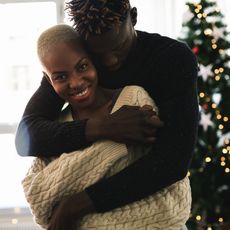 20 Holiday Gifts That Are on the Spicier Side
20 Holiday Gifts That Are on the Spicier SideFor your partner (or yourself).
By Sarah Yang
-
 The 21 Best Sexual Wellness Products to Make Your Sex Life Better
The 21 Best Sexual Wellness Products to Make Your Sex Life BetterTake charge.
By Sarah Yang
-
 Here's How to Navigate Your Sex Life in Quarantine, According to the Experts
Here's How to Navigate Your Sex Life in Quarantine, According to the ExpertsWhether you're single or in a relationship.
By Sarah Yang
-
 Cara Delevingne Wants You to Embrace Your Sexuality
Cara Delevingne Wants You to Embrace Your SexualityInside the actress and model's latest venture.
By Sarah Yang
-
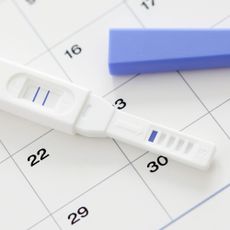 The 7 Best and Smartest Fertility Apps
The 7 Best and Smartest Fertility AppsThese are the ones to download.
By Sarah Yang
-
 These Are the Real Effects of Plan B, According to Gynecologists
These Are the Real Effects of Plan B, According to GynecologistsBusting a ton of myths here.
By Amanda Montell
-
 3 Easy Yoga Poses That Will Make Sex Better
3 Easy Yoga Poses That Will Make Sex Better*Smirk emoji*
By Amanda Montell
-
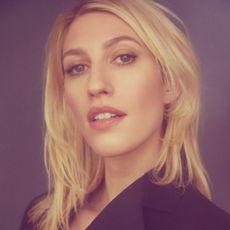 We Asked a Sex Columnist for Her Best Advice on How to Be a "Safe Slut" in 2019
We Asked a Sex Columnist for Her Best Advice on How to Be a "Safe Slut" in 2019Slutever's Karley Sciortino gets super real here.
By Amanda Montell
